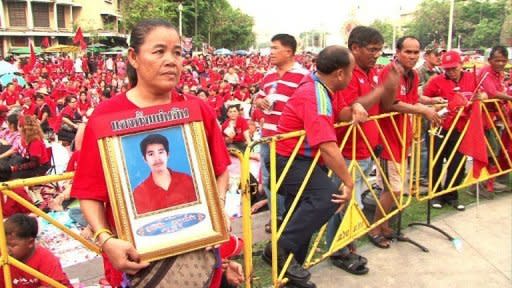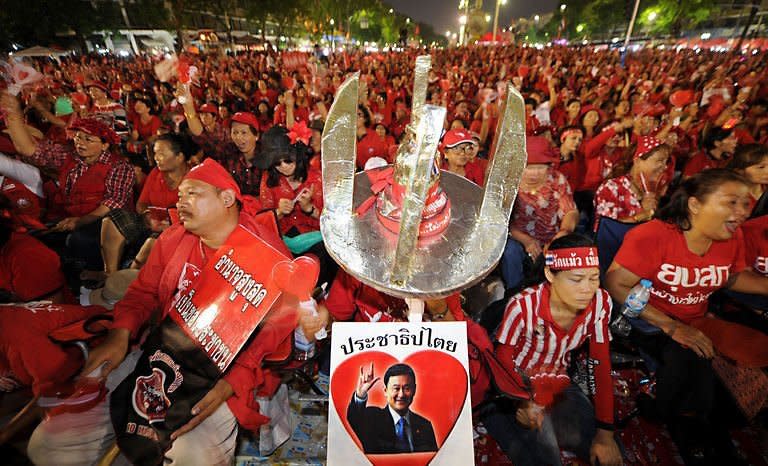Thousands of 'Red Shirts' mark year since Thai clashes
Tens of thousands of anti-government "Red Shirts" gathered in Bangkok on Sunday to mark a year since deadly clashes between troops and protesters during their mass rally in the capital. The rally peaked at 30,000 people in their signature scarlet garb, according to police spokesman Major General Prawut Thavornsiri, while a special branch source estimated the crowd size at nearer 50,000, undeterred by rainfall. Thailand, which is preparing for elections set to be held later this year, remains deeply divided following the worst civil violence in decades in April and May 2010 that left more than 90 people dead, mostly civilians. Fights between the military and protesters on April 10 last year left 26 people dead and marked a violent turning point in the rally. The protest was halted the following month, when troops firing live rounds and backed by armoured vehicles moved in to disperse the demonstrators. Fugitive former prime minister Thaksin Shinawatra, a hero for many Red Shirts, addressed Sunday's year-on demonstration -- the largest since the crackdown, if the higher estimate was correct. "One year ago, there should not have been any deaths from calls for democracy," he told them during a 15-minute speech via a video link. "They will not die for nothing, they will not be wounded for nothing. I will do my best to support the people who came out for democracy." Thaksin said he hoped people would "show their decision clearly" in the upcoming vote. The former premier, who was ousted in a 2006 coup and lives abroad to avoid a jail term for corruption, said he was calling from "a country in the Middle East where people are also calling for democracy," without being specific. The Reds began Sunday's year-on demonstration with a religious ceremony at which monks prayed for the dead and relatives held pictures of their loved ones who were killed. They later held a one-minute silence in commemoration. Among those killed on April 10 was Hiro Muramoto, a 43-year-old Japanese cameraman working for news agency Reuters. Thai police last month said there was no evidence to show troops were responsible for his death, despite initial findings by the Department of Special Investigation that suggested they might have been. "Today we pay tribute to Hiro's life, but remain discouraged that the circumstances of his death are still unknown a year later," said Stephen Adler, Reuters editor-in-chief. "Hiro's family and Reuters colleagues deserve to know how this tragedy occurred and who was behind it." Both military and protesters accused each other of using live ammunition during last year's clashes. Recent Red Shirt gatherings have attracted tens of thousands of protesters to the capital and marked a show of strength for the movement, but have been well short of the 100,000 people who joined last year's protests at their peak. Major General Wichai Sungprapai, of the Bangkok Metropolitan Police, said that around 3,300 officers would be deployed for Sunday's demonstration, which was set to go on into the night but appeared to be peaceful. The Reds view Prime Minister Abhisit Vejjajiva's government as an unelected elite because it came to power in a 2008 parliamentary vote with military backing, after a court ruling threw out the previous administration. "We don't fight for ourselves but for all Thais, for the younger generation to have equality in life," said one of Sunday's banners waved on the streets. Thaksin is hailed by the Reds for his policies for the poor while in power, but seen by the Thai ruling elite as authoritarian, corrupt and a threat to the revered monarchy. He faces terrorism charges in Thailand, accused of bankrolling last year's anti-government protests and of instigating unrest.




